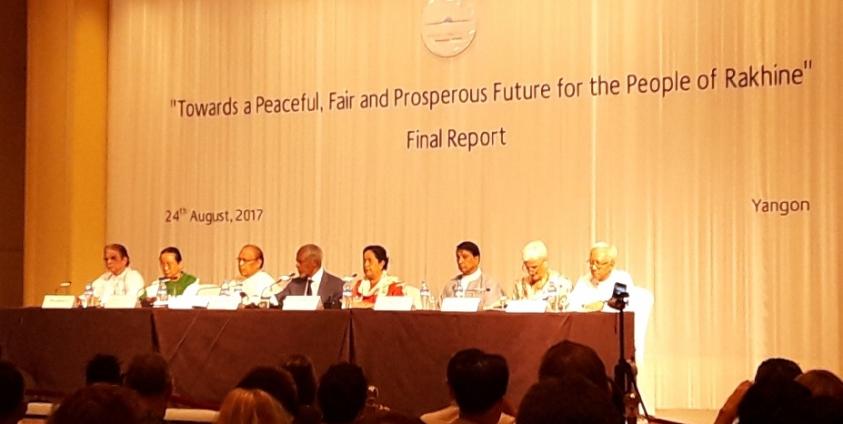Resolving the development, human rights and security crises in Rakhine State requires an urgent, “calibrated” approach to ensure that violence does not further escalate, and to redress the “legitimate grievances of local populations”, the Advisory Commission on Rakhine State has concluded.
The national commission, led by former UN Secretary-General Kofi Annan, launched its final report and recommendations on August 24 after a year-long review process. The parliamentary mandated commission was tasked with finding the root-causes of the state’s conflicts, and identifying approaches that could resolve the instability and insecurity plaguing the state.
The commission pressed the government to take “urgent and sustained action”, including improving the low socio-economic development in Rakhine State, resolving citizenship status and accelerating the national verification process and ensuring the freedom of movement for all people.
“The commission urges [the government] to accelerate the citizenship verification process under the 1982 Citizenship Law. The government needs to have a clear strategy and timeline for this process and they should communicate through a broad outreach campaign. The government should immediately ensure that those who are verified as citizens enjoy all benefits, rights and freedoms associated with citizenship,” Mr Annan said at press conference on August 24.
The advisory commission urged the government to set-up an independent authority able to swiftly address any complaints relating to the citizenship verification process. The commission also said the government should clarify the rights of those whose citizenship application is not accepted.
“The Commission also notes the need to revisit the law itself and calls on the government to set in motion a process to review the law,” in order to bring it in line with international standards, the report said.
“We are well aware that our recommendations on citizenship and freedom of movement tough on profound concerns of the Rakhine population. Nevertheless, the commission has chosen to squarely face these sensitive issues because we believe that if they are let to fester, the future of Rakhine State – and indeed Myanmar as a whole – will be irretrievably jeopardized,” said Mr Annan.
However, already objections have been raised.
Daw Khin Saw Wai, a Pyithu Hluttaw MP from Rakhine’s Rathedaung township constituency, said there is no way an amendment of the 1982 Citizenship Law will be accepted.
“We must object to [the] recommendation to amend this law. We can’t amend it. If we amend it, all the Bengalis in the Rakhine State will become citizens. As a party [representative], a member of parliament, and a [Rakhine] woman, I object to this. An attempt to effectively implement this will be met with confrontation from us,” she said.
Regarding socio-economic reforms, the advisory commission highlighted the need to boost livelihood opportunities and invest heavily in infrastructure including roads, waterways, jetties, electricity, drinking water and internet provision to improve the outlook for all residents in the country’s poorest state.
The wide-ranging recommendations also touched upon the need to improve inter-communal relations, media freedom, healthcare access, security issues, the bilateral relationship with Bangladesh, cultural opportunities in listing Mrauk-U as a heritage site and closing internally displaced persons camps.
Mr Annan emphasized at the press conference that implementing the recommendations is up to the government, and that as an advisory body, the commission does not have an enforcement mechanism.
A statement from the Stat Counsellor’s Office released on August 25, pledged to carry out “the recommendations to the fullest extent, and within the shortest timeframe possible, in line with the situation on the ground,” with a “full roadmap for implementation” expected to be released in the coming weeks.








